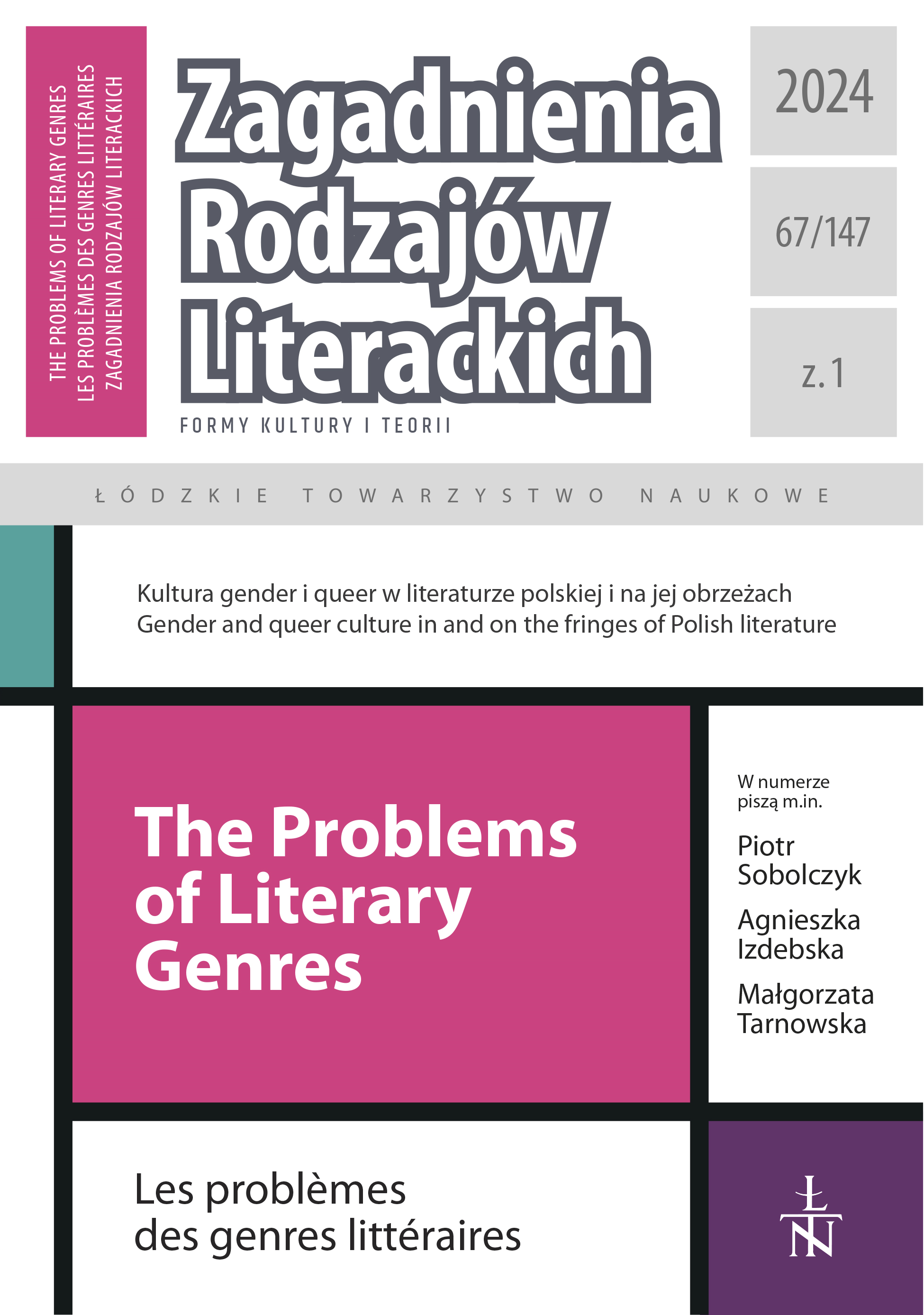Autobiographicity and Subjectivity in Stanley Cavell’s Thought
DOI:
https://doi.org/10.26485/ZRL/2024/67.1/8Słowa kluczowe:
Stanley Cavell; autobiography; psychoanalysis; philosophy as a therapy; aesthetics; Emersonian perfectionismAbstrakt
In this paper, my aim is to provide a brief characterisation of selected features of the Cavellian understanding of philosophy, especially in view of the role played by autobiographical aspects in Cavell’s philosophical and literary reflections. Autobiography would appear to be one of Cavell’s favourite sources of cognition, at the same time serving as an important medium for his self-promotion. The self-reflection which may be achieved thanks to autobiography is never purely passive; on the contrary, it entails an inherent element of introspection of one’s subjectivity. This creative dimension offers Cavell the opportunity to embark on his reading of Emersonian perfectionism, which he understood as a never-ending upward movement, an unstoppable advance towards self-perfection. At the same time, it reveals the irreducible complexity and pervasiveness of the autobiographical aspects in Cavell’s thought in their interconnections with other aspects of his thought, such as, for example, his unique approach to psychoanalysis (especially in therapeutic contexts), or to aesthetic experience. As a result, Cavell’s work in philosophy turns into a deeply personal experience which defies complete translation into discursive language.
Liczba pobrań
Bibliografia
Barthes Roland (1977), Image, music, text, trans. S. Heath, Fontana Press, London.
Borradori Giovanna (1994), An Apology for Skepticism [in:] G. Borradori, American Philosopher, Conversations with Quine, Davidson, Putnam, Nozick, Danto, Rorty, Cavell, MacIntyre, and Kuhn, University of Chicago Press, Chicago.
Bremer Józef (2021), Ludwig Wittgenstein o interpretacji marzeń sennych, “Nauka” no. 3.
Cavell Stanley (1976), Must We Mean What We Say? A Book of Essays, Cambridge University Press, Cambridge.
Cavell Stanley (1979a), Pursuit of Happiness. The Hollywood Comedy of Remarriage, Harvard Film Studies, Cambridge, MA.
Cavell Stanley (1979b), The Claim of Reason, Oxford University Press, New York.
Cavell Stanley (1979c), The World Viewed, Harvard University Press, Cambridge, MA–London.
Cavell Stanley (1987), Freud and Philosophy: A Fragment, “Critical Inquiry” vol. 13, no. 2, The Trial(s) of Psychoanalysis [winter].
Cavell Stanley (1988), In Quest of The Ordinary. Lines of Skepticism and Romanticism, University of Chicago Press, Chicago.
Cavell Stanley (1988), Themes out of School, University of Chicago Press, Chicago.
Cavell Stanley (1994), A Pitch of Philosophy. Autobiographical Exercises, Harvard University Press, Cambridge, MA.
Cavell Stanley (1996), Contesting Tears: The Melodrama of the Unknown Woman, University of Chicago Press, Chicago.
Cavell Stanley (2003), Emerson’s Transcendental Etudes, Stanford University Press, Stanford.
Cavell Stanley (2010), Little Did I Know. Excerpts from Memory, Stanford University Press, Stanford.
Critchley Simon (2005), Cavell’s “Romanticism” and Cavell’s Romanticism [in:] Contending with Stanley Cavell, ed. R.B. Goodman, Oxford University Press, Oxford.
Day William (2011), A soteriology of reading: Cavell’s excerpts from memory [in:] Stanley Cavell: Philosophy, literature and criticism, eds. J. Loxley, A. Taylor, Manchester University Press, Manchester.
DiSanto Michael John (2001), Stanley Cavell’s Skepticism and Shakespeare’s Othello, “Dalhousie Review” vol. 81, no. 3.
Filipczuk Michał (2018), Shakespeare and Skepticism. Stanley Cavell’s interpretation of Othello, “Zagadnienia Rodzajów Literackich” no. 61(1).
Filipczuk Michał (2023), Stanley Cavell Philosophical Literary Criticism. An Outline of Method, “The Ignatianum Philosophical Yearbook” no. 29(2).
Fischer Michael (1989), Stanley Cavell and Literary Skepticism, University of Chicago Press, Chicago.
Foucault Michel (1995), What is an Author? [in:] Textual Strategies, ed. J.V. Harari, Cornell University Press, Ithaca–New York.
Hillman James (1983), Healing Fiction, Spring Publication, Inc., Barrytown, New York.
Gould Timothy (1998), Hearing Things, University of Chicago, Chicago.
Hagberg Garry (2008), The Self. Reflected [in:] G. Hagberg, Describing Ourselves. Wittgenstein and Autobiographical Consciousness, Clarendon Press, Oxford.
Kovalainen Heikki (2010), Emersonian Moral Perfectionism. An Alternative Ethics — But in What Sense?, “European Journal of Pragmatism and American Philosophy” no. 2(2).
LaRocca David (ed.) (2019), Inheriting Stanley Cavell. Memories, Dreams, Reflections, Bloomsbury Academic, New York.
Mulhall Stephen (2011), Stanley Cavell: Philosophy’s Recounting of the Ordinary, Oxford University Press, Oxford.
Nehamas Alexander (1986), What An Author Is, “Journal of Philosophy” no. 83(11).
Rothman William (2019), Cavell Reading Cavell [in:] Inheriting Stanley Cavell. Memories, Dreams, Reflections, ed. D. LaRocca, Bloomsbury Academic, New York.
Rudrum David (1974), Stanley Cavell and the Claim of Literature, Johns Hopkins University Press, Baltimore.
Saito Naoko (2005), The Gleam of Light: Moral Perfectionism and Education in Dewey and Emerson, Fordham University Press, New York.
Sartre Jean-Paul (1964), The Words, Brazillier, New York.
Schuff Jochen (2020), Aesthetics and Autobiography in Cavell, “Estetika: The European Journal of Aesthetics” no. 57(2).
Sendyka Roma (2006), Nowoczesny esej. Studium historycznej świadomości gatunku, TAiWPN Universitas, Kraków.
White Hayden (2010), The Fiction of Narrative: Essays on History, Literature and Theory, 1957–2007, John Hopkins University Press, Baltimore.
Wittgenstein Ludwig (1958), Philosophical Investigations, trans. G.E.M. Anscombe, Blackwell Publishers, Oxford.
Pobrania
Opublikowane
Jak cytować
Numer
Dział
Licencja
Prawa autorskie (c) 2024 Łódzkie Towarzystwo Naukowe i autorzy

Utwór dostępny jest na licencji Creative Commons Uznanie autorstwa 4.0 Międzynarodowe.







